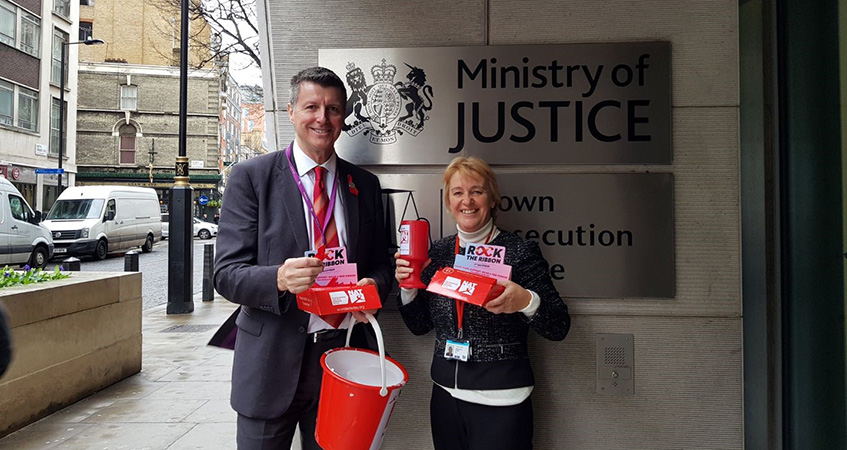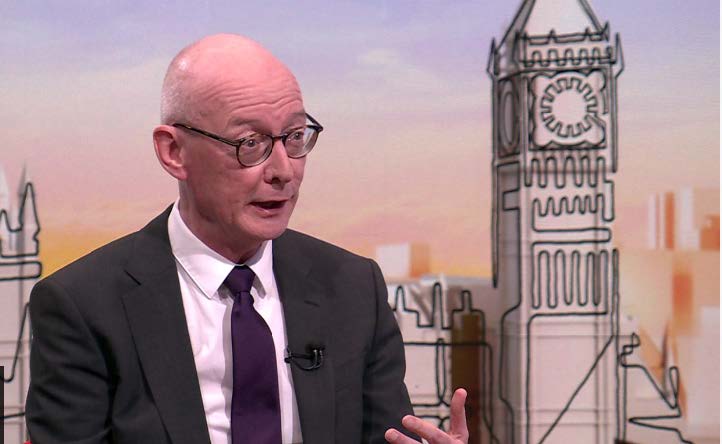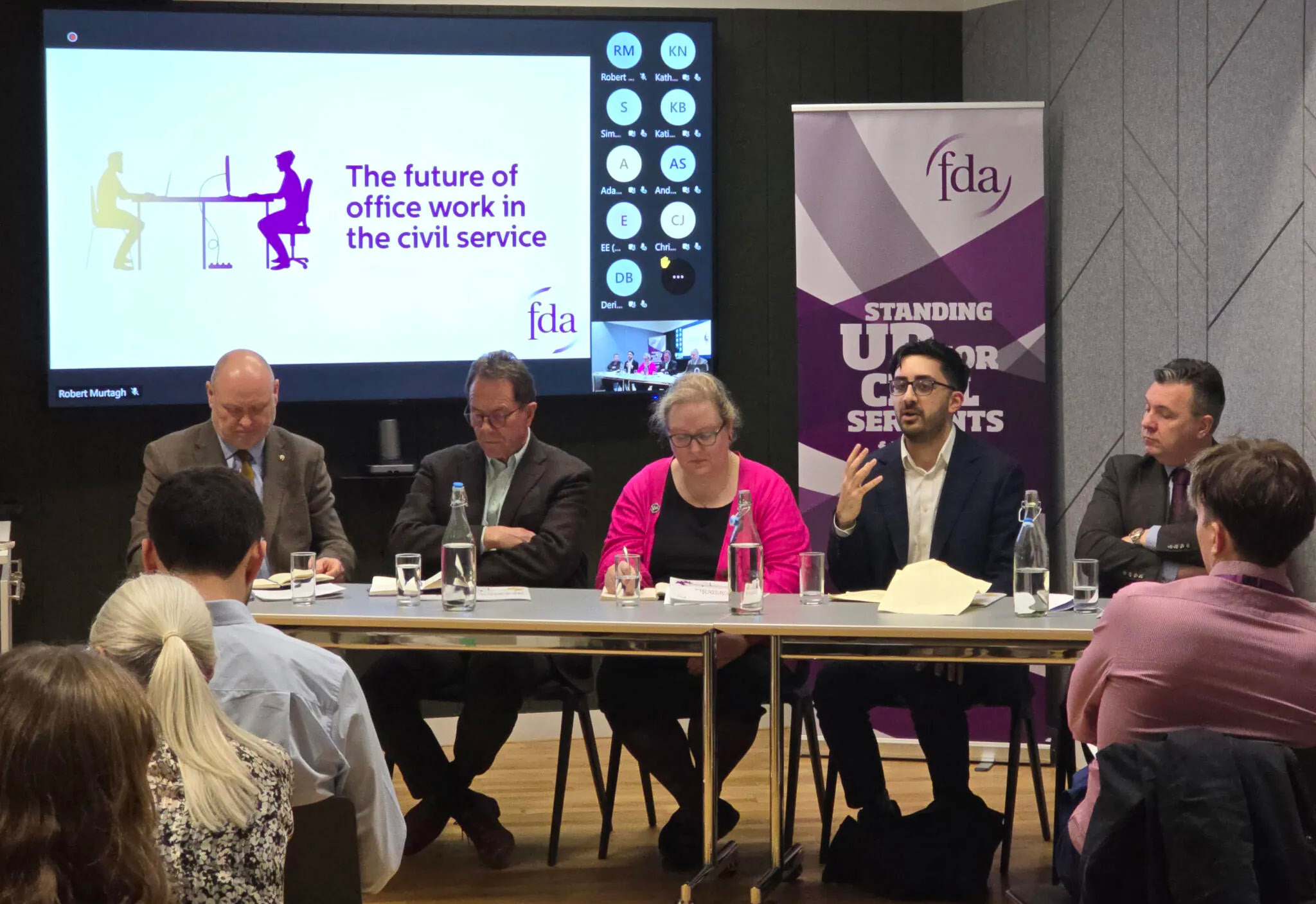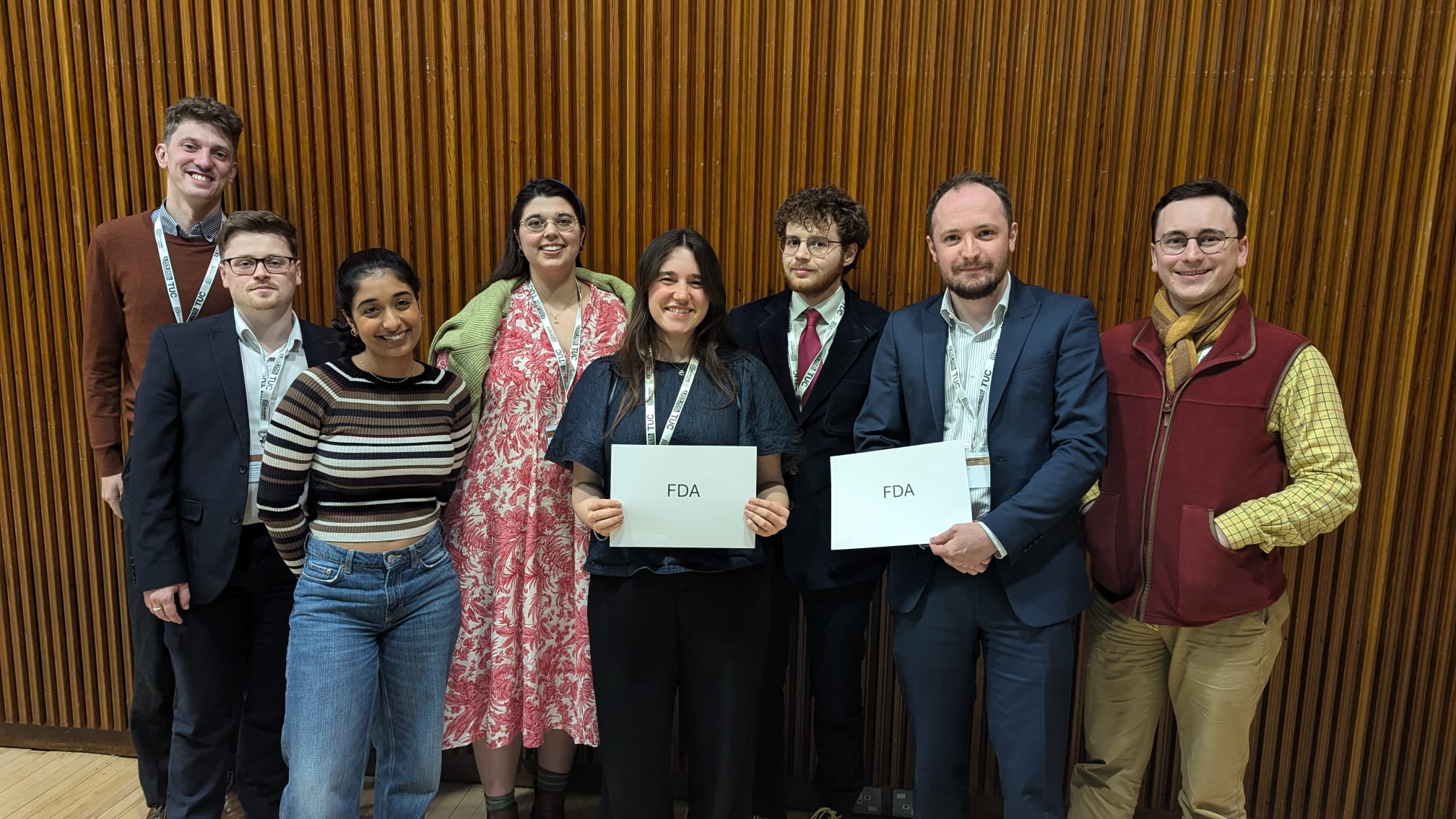World AIDS Day: How FDA Convenor Barry Snelgrove and his MoJ colleagues raised £2,400
FDA Convenor Barry Snelgrove discusses his fundraising efforts in the MoJ and why it’s still so important to draw attention to World AIDS Day.

Barry Snelgrove, FDA Convenor in the MoJ (left) and Jackie Green, PCS National Vice President and MoJ DTUS Co-Chair (right)
For the past five years I have been leading a Ministry of Justice fundraising initiative on World AIDS Day, which falls on December 1st. Initially we raised £300, doubled it in the following year — and then we exceeded £1,000 in 2016. Last year, however, we smashed our target by doubling funds raised with a current total of £2,400 donated to the National AIDS Trust.
So why did I do this?
In the 1990’s I lost two close friends to AIDS. The first man to die was a gay man called Colin who was 31 and an ex-boyfriend of mine. Colin’s mind was badly affected and he died a terrible death that must have been terrifying for him.
When he died, his family were so ashamed of the cause of his death that they refused to allow any of his gay friends to see him or to go to his funeral. This was at a time when HIV was a death sentence, and all sorts of myths existed about how one could contract HIV. It was a time of discriminatory behaviour, where people with HIV lost their jobs and were ostracised for their condition.
The second friend was a civil servant called David Gunner. David had lived all his life with haemophilia and, tragically, he contracted HIV following a blood transfusion. David battled death several times and I must have visited him in every hospital in central London.
David was such a fighter and I’ll never forget going to see him in St Thomas’ Hospital just months before he died. He said: “I can’t stay long I’m going out tonight!”
I was incredulous and asked where he was going. He told me his favourite Steely Dan were playing at Wembley – and he had a ticket. Nothing was going to dissuade him, so I went with him to the venue and arranged to meet him afterwards and take him back to the ward.
The hospital was locked on our return and a rather exhausted David said he felt like a naughty schoolboy escaping the dorm for the night. David later died in 1999, aged 43 at Mildmay Hospice — just too late to benefit from combination therapy.
The National AIDS Trust and other charities fought hard to get research applied to finding successful treatments for this terrible disease. In the United States, ACT-UP challenged the establishment to stop seeing this disease as a “gay plague” spread through irresponsible behaviour, and instead recognise a terrible tragedy that had to be fixed as millions were dying: men, woman, gay and straight.
Celebrities started to draw attention to the cause and “came out” when their diagnosis, or that of loved ones, was evident. Public figures like Elizabeth Taylor, Princess Diana and Elton John raised awareness and, finally, treatments were developed which are now very successful. A preventative drug called PREP now successfully stops people contracting HIV, and the infection rate that had been rising dramatically among young people has recently significantly dropped.
So if it’s solved, why still draw attention to World AIDS day?
Well, the truth is that while we have the capacity to solve this using current drugs, it was quite a fight to get PREP out there for general use and I suspect it will come under scrutiny as use expands. The National AIDS Trust fought a legal battle to do this and the results are extremely encouraging, with HIV infection falling dramatically.
We are also lucky – in the rest of the world, especially countries in Africa, they are less fortunate. I know from my contacts in Zimbabwe that ALL of the men who worked in a cooperative in Murewa just outside of Harare where my friend undertook Voluntary Service Overseas, are now dead. Some of their wives are dead and younger children have had to bring up their even younger siblings. So there is still much to be done.
Each year, my colleagues and I in the Ministry of Justice have increased the amount we raised — and I’m determined that we will do the same this year. The first thing I did was to tell my story and inspire help from my immediate team. We assembled collection boxes for each kitchen in the MoJ’s home at 102 Petty France, and have a rota for shaking buckets at the entrance to the building.
Some people are very generous and pay more than the £1 suggested for their red ribbon. Some stop and talk about friends and relatives who died or have HIV. Last year, there were team cake sales and HM Courts and Tribunal Service really went to town, raising over £600 through events. I did a 10k run that raised £635 so far and Malcolm Bryant, Deputy Director at the Legal Aid Agency, not only ran with me (and faster!) but told his story of living with HIV for three decades and the rollercoaster he has lived through — a truly inspiring story, which you can hear more about here.
This year due to ill health, I have taken one step back and HMCTS are leading the initiative with my help.
Barry Snelgrove is the FDA Convenor in the Ministry of Justice, and works as a senior manager in the women and Modern slavery team (HMPPS).
Related News
-

Meaningful reform
It’s time to lead the civil service, not just the morning news round, says Dave Penman.
-

Hybrid working: Led by evidence, not headlines
Tom Nathan shares the findings and recommendations of the FDA’s recent report on ‘The future of office working in the civil service’.
-

FDA attends TUC Young Workers’ 2025
This March, an FDA delegation attended the annual TUC Young Workers’ Conference in Congress House, London.